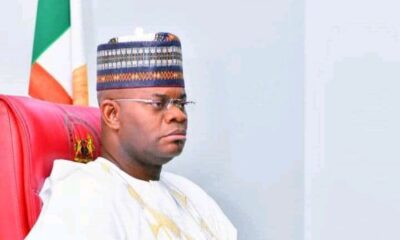Former Senate President, Dr Bukola Saraki, and Governors Kayode Fayemi and Dapo Abiodun of Ekiti and Ogun States respectively have thrown their weight behind the trans-generational compendium to commemorate the 60th anniversary of Nigeria.
The book, entitled Nigeria @60: Foremost Nigerians of the Last 60years; is written by former Society Editor of Thisday, Lanre Alfred. It will hit bookshelves across the nation and beyond in the first week of October.
In his Prologue entitled‘Enriching the History of a Giant’, Senator Saraki espouses Nigeria’s greatness which he agrees had been tested in several ways. “This book “Nigeria @60: Foremost Nigerians in the Last 60 Years” by Lanre Alfred, a journalist with many years experience, is definitely going to add fresh pages to the body of literature and biographical work on this great country.
As someone, who loves reading biographies, the author’s decision to tell the Nigerian story through account of the contributions and achievements of selected citizens remains interesting and another attraction for me.

This unique attempt at recounting our national history also seeks to put on display the roles of the selected players in national development over the years. It also presents a challenge for those key players, who are alive to strive to improve on their roles while also giving the rest of the citizenry the opportunity to honestly and genuinely assess the account and the roles it ascribes to these individuals.”
Interestingly, Saraki says Nigeria has been the country whose huge resources and dynamic, resourceful, creative, ebullient, and hard-working people represent the hope of the black man to stand on an even dais with the most developed part of the world. “She is the country that has carried the burden of the rest of Africa during difficult times as she did during the period of the apartheid system in South Africa and the liberation struggles in other parts of Southern Africa,” he states.
Saraki adds that though Nigeria might not have fully fulfilled the aspirations of her citizens and the rest of the world, she has continued to play a major role in stabilizing her region and the continent at large. Thus, he says he welcomes any attempt to give a good account of Nigeria’s existence as an independent country in the last six decades.

The former two-term governor of Kwara State concludes that Nigeria will overcome her challenges and fulfill her manifest destiny because there are several ways of leading Nigeria out of the woods; “One way is the one Lanre Alfred has taken with this book; celebrating the nation’s birthday through a revisit of the role of some of the key players.”
In the Foreword,Dr. Kayode Fayemi, the Ekiti State governor, writes that Nigeria is an amazing story and an evolving power whose destiny is far beyond the convulsive spasm that often diminishes the narrative of her undeniable glory. “This lesson is what has attracted the intellectual lens of Lanre Alfred in this insightful book. He takes us through an undulating labyrinth of the Nigerian story and points our attention to the mesh of our socio-cultural plurality, which ultimately makes ours a complex political experiment.
“He depicts the nation’s foundational challenge as that of a sailing mission without a rudder and a flying expedition without a compass. For it was clear that, at independence, there was no consensus around vision, purpose, and strategy for the actualization of the nation’s dream.”
Like Saraki, Governor Fayemi concurs that the irony of the Nigeria story is that while her inadequacies are apparent to all, her progress is difficult to ignore either. “And this is the reality, which many critics and commentators have failed to factor into their evaluation of the nation’s trajectory. One of the ways to appreciate this progress might be to focus on the contribution of many compatriots, who have invested their God-given talent and creativity for the progress of the nation in the different segments of our national life,” he says.
Governor Fayemi says he is satisfied with Alfred’s optimistic approach to the appreciation of Nigeria because, “He has elected to gauge our progress in terms of verifiable and invaluable contributions of some individuals, who have greatly impacted the nation and whose contributions to her development since independence, are of immense significance.
“This approach is not only a commendable reward system; it is also an effective story-telling strategy that properly situates the nation’s milestones around the exploits of her heroes and heroines. To suggest that Nigeria has not made progress is to declare that the works of her heroes and heroines are in vain. It is to assume that, generally, nonentities had led the nation in politics, business, culture, religion, and leadership!”
He also commends the efforts that went into putting the book together, saying, “Alfred has launched his fecund mind into a fertile territory that many people would have ignored. It is another demonstration of his depth, prodigious intellect, and mastery of the nation’s story as a social commentator and chronicler. He has taught us a new lesson that nation-building is a collective responsibility and that a nation’s prosperity is the aggregation of the industry and prosperity of her citizens.”
In a correspondence with the author, Governor Abiodun of Ogun State lauded the ingenuity of the book while praising the writing proficiency of Alfred who he said has evolved as not just a reporter but a redoubtable historian. Abiodun stated that he would gladly recommend the book for reading across a broad spectrum of the society because “of its depth and richness and the fact that it makes for easy and compelling reading.” He continued, “This book is a storehouse of information about the people that made and are making Nigeria great. History well told is beautiful. Many of the historians who most appeal to the general reading public know the importance of dramatic and skillful writing as well as of accuracy and this is where Alfred has excelled with this book.”
However, the book is dedicated to Globacom chairman, Dr Mike Adenuga Jnr, as an homage to his humanity and relentless strides at rewriting the African business narrative; for standing tall and wading through odds with the courage of a knight and confidence of a champion. Interestingly, in the midst of the doom and gloom, the pervasive fear of the Corona-Virus pandemic, and the flagging faith of Nigerians per their survival, the chairman of Globacom Limited, raised hopes and planted joy in the bosoms of Nigerians. His huge donations to the Federal Government of Nigeria and several state governments play a huge role in containing the ravaging virus.
Alfred’s new book, which attempts to profile the trajectories of Nigeria’s heroes past and present, is the latest in a burgeoning corpus that includes the popular coffee table books; Titans…The Amazing Exploits of Nigeria’s Greatest Achievers; and Highlife – Lifestyles of Nigeria’s Rich and Famous; and biographies like Pacemaker – Triumphs of Igho Sanomi at 40; The Lion of Afia Nsit – Triumphs of Scott Tommey at 45; Julius Rone…The Jewel of the Delta; and Dapo Abiodun…The Heart of Prince.

 BIG STORY2 days ago
BIG STORY2 days ago
 BIG STORY2 days ago
BIG STORY2 days ago
 BIG STORY5 days ago
BIG STORY5 days ago
 BIG STORY1 day ago
BIG STORY1 day ago
 BIG STORY1 day ago
BIG STORY1 day ago
 BIG STORY4 hours ago
BIG STORY4 hours ago
 BIG STORY3 days ago
BIG STORY3 days ago
 BIG STORY3 days ago
BIG STORY3 days ago








































